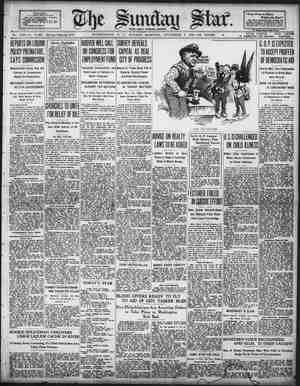Evening Star Newspaper, November 9, 1930, Page 96
You have reached the hourly page view limit. Unlock higher limit to our entire archive!
Subscribers enjoy higher page view limit, downloads, and exclusive features.
THE SUNDAY STAR, WASHD BT R T DD 4 W —on AT T .~ T o —— P 1 = - S Senator Observes Russia’s Fra tractors to the country ~ - districts they had to coax % Ppeasants to approach q them for any purpose whatever, much as we once had to accustom our horses to approach i trains. ’ By Alben W. Barkley. i (Umtzd States Senator From Kentucky. ) USSIA may be not described—as the ‘land of the five-day week, and continuous en- forced famine. The five-day week is universal in industry, yet every essential food commodity is rationed under govesnment control. Only by creating a surplus of agricpltural products for export can the nation accumulate funds with which to pay for the tremendous , steel turbines and blast furnaces E ! - -~ ORI 5 women awaiting their weekly ration of flour, meats, fats, even vodka. They are not “bread lines,” as we understand the term in America, for these people have work, shelter, clothing, and money with which to buy their food. But they can secure only limited amounts, accord- ing to an arbitrary per capita ration fixéd by some remote official. And when they have used up that weekly quota, their money is valueless. They cannot buy more. ,. In theory, the food allowance is fixed almost at the minimum which will sustain the vigor and health of the population. But within rea- sonable limits, certain adjustments may be made to meet individual requirements. Ne one, however, may forego his ration for the pure pose of hoarding. It is illegal to carry on trade in the rationed supplies. A reader or town crier seated in a Petrograd doorway. Even today this reli medieval days persists in Russia, for there are still many who cannot write, which is another of the problems to which Russia seeks a quick fective answer. IHADrudoltheu(oodnnesnnnlm ago. I was prepared when I reached Mos- cow in mid-August, therefore, to witness long lines of dull, hopeless, half-starved people ex- isting from day to day almost by compulsion. Unconsciously I had come to think of the food lines as the “bread line” and had pic- tured «ll of Russia as a nation which had been for 13 years awaiting the “handout.” Such an existence, I knew, must leave its mark indel- libly upon the spirit of the people. How far was this picture from the one en- eountered may be judged by the fact that when I came upon my first line this Summer I casually assumed, without asking any question, that it was a line of workers waiting to get into a movie. The crowd was jovial. talking excitedly, broken here and there by playing, or newspapers while awaiting their turn. It was all a matter of routine, taken in much the spirit as we take our weekly marketing in the cities and towns throughout America. ND the “bread line” was but a small part of what I unlearned about Russia during my seven-week sojourn. In fact, if I were asked whether I learned or unlearned more about that vast land of contradictions and fermentations ve to think carefully before answer- territory is so vast, the life so com- one seldom is safe in saying that 80 is true of Russia as a whole. Today transition between the old order that the traveler can be certain the course of rehabilitation. i it 1 g the ancient glories of empire. ipEEsEE BE §§§§~§~§Eg THHHE it gz;ig g g i selves, they represent great ad diffusion of of culture and tradition and ed plant— was much broader for the United States in 1830 than it was for Russia in 1917. i g E &5 fHs : g } 1HH it Fie 4 4 .
